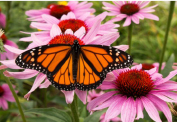How has your garden coped this Summer?
Many of our gardens have struggled over the last few hot, dry months and our plants are showing signs of stress. We have had so little rain and unusually high temperatures, and some of our borders are looking parched, shrivelled and sad. You are not alone!

We avoid planting in July and August: the ground is dry and hard to dig; watering would need to be carried out almost daily and plants struggle to establish their roots and bloom as they focus all their energies on coping with the elements. Stressed plants are more prone to pests and diseases. However here are some tips that can make a difference to how well your garden survives a hot, dry Summer.
Small pots and containers heat up and dry out more quickly so rationalise your containers, and though it’s good to arrange them in groups, use the biggest sizes that can be accommodated by the space and your budget. When you water, stand over each plant for at least 10 seconds letting the water drain down through the soil to the roots. A light sprinkle encourages the roots to come to the surface and evaporates quickly from the surface and never penetrates down to where it’s needed.
Compacted soil means any water will run off before being absorbed into the soil. So cultivate your borders with a hoe or fork, to lightly break up the surface crust. Then, apply a good quality, organic mulch to your borders and pots – this will perform several functions: feeding the soil; encouraging worms to breaking up the structure of the soil; shading the soil from direct sunlight and thereby cooling it; reducing water loss by evaporation and retaining any moisture; and finally suppressing weeds.
As you notice some leaves/stems getting munched or succumbing to disease, do remove them. Weakened plant material attracts pests and bugs, and can make the problem worse. Think about the orientation of your garden and where the sun falls during the day, and consider whether the plants in the sunniest spot are suitable for those dry, hot conditions. Perhaps you need to think about introducing some shade, for example by planting a small tree once the weather cools down.
And Autumn is on the horizon – the best time in the gardening calender to replant a garden. The soil cools down and becomes moister and easier to work. The prevailing conditions place less stress on plants, enabling them to focus on establishing their roots, and preparing themselves for winter and a good display next year.
So – look forward to that!
Happy Gardening!
Anne Fraser and Caroline Streets
Planting Gems
07729 835988 & 07930 876348

